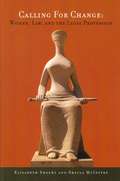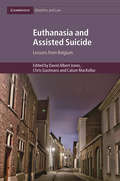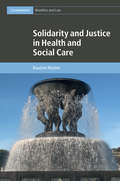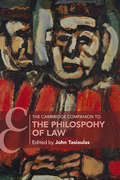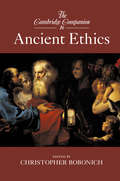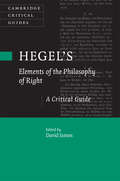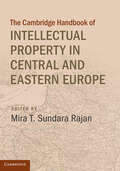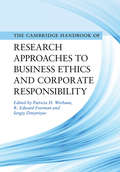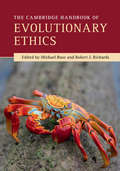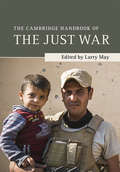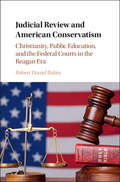- Table View
- List View
Calling WPC Crockford
by Ruth D'AlessandroIn the early 1950s, the Berkshire Constabulary finally opened its ranks to more women. And WPC Crockford was one of those early pioneers... When 21-year-old Gwendoline Crockford signed up to join the Berkshire Constabulary in 1951, she had little idea of what she was getting herself into. Whether carrying a human skeleton out of the woods, finding a missing child, investigating thefts, or chasing an escaped zebra, every day brought fresh adventures.In this nostalgic, tender and honest account of post-war British society, we follow a bright, determined woman navigating a man's world, serving as many people as she can. From performing traffic duties to unravelling a dark secret at the heart of an impoverished family, WPC Crockford's career was full of joy, thrills – and heartbreak.Written by her daughter Ruth, this is the story of a real-life woman police constable as she embarks on her police career.
Calling for Change: Women, Law, and the Legal Profession
by Elizabeth Sheehy Sheila McIntyreUnique in both scope and perspective, Calling for Change investigates the status of women within the Canadian legal profession ten years after the first national report on the subject was published by the Canadian Bar Association. Elizabeth Sheehy and Sheila McIntyre bring together essays that investigate a wide range of topics, from the status of women in law schools, the practising bar, and on the bench, to women's grassroots engagement with law and with female lawyers from the frontlines. Contributors not only reflect critically on the gains, losses, and barriers to change of the past decade, but also provide blueprints for political action. Academics, community activists, practitioners, law students, women litigants, and law society benchers and staff explore how egalitarian change is occurring and/or being impeded in their particular contexts. Each of these unique voices offers lessons from their individual, collective, and institutional efforts to confront and counter the interrelated forms of systemic inequality that compromise women's access to education and employment equity within legal institutions and, ultimately, to equal justice in Canada.
Cambridge Applied Ethics: Ethics and Health Care
by John C. MoskopWho should have access to assisted reproductive technologies? Which one of many seriously ill patients should be offered the next available transplant organ? When may a surrogate decision maker decide to withdraw life-prolonging measures from an unconscious patient? Questions like these feature prominently in the field of health care ethics and in the education of health care professionals. This book provides a concise introduction to the major concepts, principles and issues in health care ethics, using case studies throughout to illustrate and analyse challenging ethical issues in contemporary health care. Topics range widely, from confidentiality and truthfulness to end-of-life care and research on human subjects. Ethics and Health Care will be a vital resource for students of applied ethics, bioethics, professional ethics, health law and medical sociology, as well as students of medicine, nursing and other health care professions.
Cambridge Bioethics and Law: Electronic Health Records and Medical Big Data
by Sharona HoffmanThis book helps readers gain an in-depth understanding of electronic health record (EHR) systems, medical big data, and the regulations that govern them. It analyzes both the shortcomings and benefits of EHR systems, exploring the law's response to the creation of these systems, highlighting gaps in the current legal framework, and developing detailed recommendations for regulatory, policy, and technological improvements. Electronic Health Records and Medical Big Data addresses not only privacy and security concerns but also other important challenges, such as those related to data quality and data analysis. In addition, the author formulates a large body of recommendations to improve the technology's safety, security, and efficacy for both clinical and secondary (such as research) uses of medical data.
Cambridge Bioethics and Law: Empirical Bioethics
by Michael Dunn Alan Cribb Jonathan IvesBioethics has long been accepted as an interdisciplinary field. The recent 'empirical turn' in bioethics is however, creating challenges that move beyond those of simple interdisciplinary collaboration, as researchers grapple with the methodological, empirical and meta-ethical challenges of combining the normative and the empirical, as well as navigating the difficulties that can arise from attempts to transcend traditional disciplinary boundaries. Empirical Bioethics: Practical and Theoretical Perspectives brings together contributions from leading experts in the field which speak to these challenges; providing insight into how they can be understood and suggestions for how they might be overcome. Combining discussions of meta-ethical challenges, examples of different methodologies for integrating empirical and normative research, and reflection on the challenges of conducting and publishing such work, this book will both introduce the novice to the field and challenge the expert.
Cambridge Bioethics and Law: Lessons from Belgium (Cambridge Bioethics and Law #42)
by Jones Calum Mackellar Chris Gastmans David AlbertExamining the evidence from Belgium - one of only five countries where euthanasia is practised legally - an international panel of experts considers the implications of legalised euthanasia and assisted suicide. Looking at the issue from an international perspective, the authors have written an invaluable in-depth analysis of the ethical aspects of this complex area. The discussion forms a solid foundation for informed debate about assisted dying. With contributors from a broad range of disciplines, this book is ideal for students, academics, legislators and anyone interested in legal, medical, social and philosophical ethics. A vital and timely examination of a growing phenomenon and one of the most challenging ethical questions of our time.
Cambridge Bioethics and Law: Regulating Patient Safety
by Oliver QuickSystematically improving patient safety is of the utmost importance, but it is also an extremely complex and challenging task. This illuminating study evaluates the role of professionalism, regulation and law in seeking to improve safety, arguing that the 'medical dominance' model is ill-suited to this aim, which instead requires a patient-centred vision of professionalism. It brings together literatures on professions, regulation and trust, while examining the different legal mechanisms for responding to patient safety events. Oliver Quick includes an examination in areas of law which have received little attention in this context, such as health and safety law, and coronial law, and contends in particular that the active involvement of patients in their own treatment is fundamental to ensuring their safety.
Cambridge Bioethics and Law: Solidarity and Justice in Health and Social Care (Cambridge Bioethics and Law #41)
by Ter Meulen RuudIn this timely book, Ruud ter Meulen argues that the current trend towards individual financial responsibility for health and social care should not be at the expense of the welfare of vulnerable and dependent individuals. Written with a multidisciplinary perspective, the book presents a new view of solidarity as a distinct concept from justice with respect to health and social care. It explains the importance of collective responsibility and takes the debate on access to healthcare beyond the usual framework of justice and rights. Academics from a range of backgrounds, including sociology, ethics, philosophy and policy studies will find new perspectives on solidarity and fresh ideas from other disciplines. Policymakers will better appreciate the contribution of family carers to the well-being of dependent and vulnerable people, and the importance of the support of solidarity in these types of care.
Cambridge Classical Studies: Justice and Reciprocity in Aristotle's Political Philosophy
by Kazutaka InamuraThis book illustrates how Aristotle's ethical concepts such as justice, reciprocity and friendship offer a basis for his political philosophy. In particular, it points out the importance of Aristotle for articulating the concept of a civic relationship and developing a theory of integration, by exploring how he includes a wide variety of people within the deliberative and judicial processes. Comparisons between Aristotle's own thought and present-day 'Aristotelian' political theories, such as communitarianism, civic republicanism and the capabilities approach, are also among the unique approaches offered by the book and are used to illustrate his original vision of politics. They can also, however, offer new insights into the problems of how to read his texts appropriately in their context and why we now need to read them, not only out of an antiquarian interest but also out of our concern for politics.
Cambridge Companions to Law: The Cambridge Companion to Public Law
by David Feldman Mark Elliott Elliott, Mark and Feldman, DavidThe Cambridge Companion to Public Law examines key themes, debates and issues in contemporary public law. The book identifies and draws out five key themes: the notions of government and the state; the place of the state and public law in the world at large; relationships between institutions and officials within the state; the legitimacy of institutions; and the identity and value of public law in relation to politics. The book also presents a contemporary examination, taking account of the substantial changes witnessed in this area in recent decades and of the resulting need to reassess orthodox accounts of the subject. Written by leading authorities drawn from across the common law world, their approach is rigorous, engaging and highly accessible. This Companion acts as both a thoughtful introduction and a collection that consciously moves the discipline forward.
Cambridge Companions to Law: The Cambridge Companion to the Philosophy of Law (Cambridge Companions To Law Series)
by John TasioulasWhat is the nature of law as a form of social order? What bearing do values like justice, human rights, and the rule of law have on law? Which values should law serve, and what limits must it respect in serving them? Are we always morally bound to obey the law? What are the philosophical problems that arise in specific areas of law, from criminal and tort law to contract law and public international law? The book provides an accessible, comprehensive, and high quality introduction to the major themes of legal philosophy written by a stellar international cast of contributors, including John Finnis, Martha Nussbaum, Fred Schauer, Onora O'Neill and Antony Duff. The volume is an exceptional teaching tool that provides a critical introduction to cutting-edge work in the philosophy of law.
Cambridge Companions to Philosophy: The Cambridge Companion to Ancient Ethics (Cambridge Companions to Philosophy)
by Christopher BobonichThe field of ancient Greek ethics is increasingly emerging as a major branch of philosophical enquiry, and students and scholars of ancient philosophy will find this Companion to be a rich and invaluable guide to the themes and movements which characterised the discipline from the Pre-Socratics to the Neo-Platonists. Several chapters are dedicated to the central figures of Plato and Aristotle, and others explore the ethical thought of the Stoics, the Epicureans, the Skeptics, and Plotinus. Further chapters examine important themes that cut across these schools, including virtue and happiness, friendship, elitism, impartiality, and the relationship between ancient eudaimonism and modern morality. Written by leading scholars and drawing on cutting-edge research to illuminate the questions of ancient ethics, the book will provide students and specialists with an indispensable critical overview of the full range of ancient Greek ethics.
Cambridge Critical Guides: Hegel’s ‘Elements of the Philosophy of Right’
by David JamesHegel's Elements of the Philosophy of Right, one of the classic texts of German Idealism, is a seminal work of legal, social and political philosophy that has generated very different interpretations since its publication in 1821. Written with the advantage of historical distance, the essays in this volume adopt a fresh perspective that makes readers aware of the breadth and depth of this classic work. The themes of the essays reflect the continuing relevance of the text, and include Hegel's method, the concept of property, Hegel's view of morality, the concept of Sittlichkeit, the modern family, the nature and tensions of civil society, and the question of the modernity of the Hegelian state. The volume will be of interest to all scholars and students of German Idealism and the history of political thought.
Cambridge Handbook of Institutional Investment and Fiduciary Duty
by James P. Hawley James P. Hawley Andreas G. F. Hoepner Keith L. Johnson Joakim Sandberg Edward J. Waitzer Andreas G. F. Hoepner Keith L. Johnson Joakim SandbergThe Cambridge Handbook of Institutional Investment and Fiduciary Duty is a comprehensive reference work exploring recent changes and future trends in the principles that govern institutional investors and fiduciaries. A wide range of contributors offer new perspectives on dynamics that drive the current emphasis on short-term investment returns. Moreover, they analyze the forces at work in markets around the world which are bringing into sharper focus the systemic effects that investment practices have on the long-term stability of the economy and the interests of beneficiaries in financial, social and environmental sustainability. This volume provides a global and multi-faceted commentary on the evolving standards governing institutional investment, offering guidance for students, researchers and policy-makers interested in finance, governance and other aspects of the contemporary investment world. It also provides investment, business, financial media and legal professionals with the tools they need to better understand and respond to new financial market challenges of the twenty-first century.
Cambridge Handbook of Intellectual Property in Central and Eastern Europe
by Mira T. Sundara RajanIntellectual property law faces serious challenges worldwide, with many in the international community arguing that the law fails to provide much-needed support for either individual rights or the public interest in the technological environment. The Cambridge Handbook of Intellectual Property in Central and Eastern Europe offers a novel look at intellectual property issues through the lens of the post-socialist and transitional experience in Central and Eastern European countries. Contributors include both recognized and emerging leaders in their jurisdictions of interest, and experts on US, European Union, and international law. Taken together, they offer a thought-provoking critique of current approaches and build a compelling case for cogent policymaking. This important work reflects the formative experiences of a difficult history, demonstrating the courageous optimism of scholars in a region that has repeatedly overcome the challenges of the past, while consistently looking to its authors and innovators for leadership and inspiration.
Cambridge Handbook of Research Approaches to Business Ethics and Corporate Responsibility
by Freeman Werhane Patricia H. R. Edward Sergiy DmytriyevWhile there is a large and ever-expanding body of work on the fields of business ethics and corporate social responsibility (CSR), there is a noted absence of a single source on the methodology and research approaches to these fields. In this book, the first of its kind, leading scholars in the fields gather to analyse a range of philosophical and empirical approaches to research in business ethics and CSR. It covers such sections as historical approaches, normative and behavioural methodologies, quantitative, qualitative and experimental perspectives, grounded theory and case methodologies, and finally a section on the role of the researcher in research projects. This book is a valuable and essential read for all researchers in business ethics and CSR, not only for those starting out in the fields, but also for seasoned scholars and academics.
Cambridge Handbooks in Philosophy: The Cambridge Handbook of Evolutionary Ethics (Cambridge Handbooks in Philosophy)
by Michael Ruse Richards Robert J.Evolutionary ethics - the application of evolutionary ideas to moral thinking and justification - began in the nineteenth century with the work of Charles Darwin and Herbert Spencer, but was subsequently criticized as an example of the naturalistic fallacy. In recent decades, however, evolutionary ethics has found new support among both the Darwinian and the Spencerian traditions. This accessible volume looks at the history of thought about evolutionary ethics as well as current debates in the subject, examining first the claims of supporters and then the responses of their critics. Topics covered include social Darwinism, moral realism, and debunking arguments. Clearly written and structured, the book guides readers through the arguments on both sides, and emphasises the continuing relevance of evolutionary theory to our understanding of ethics today.
Cambridge Handbooks in Philosophy: The Cambridge Handbook of The Just War
by Larry May Shannon Fyfe Eric RitterWhat makes a war just? What makes a specific weapon, strategy, or decision in war just? The tradition of Just War Theory has provided answers to these questions since at least 400 AD, yet each shift in the weapons and strategies of war poses significant challenges to Just War Theory. This book assembles renowned scholars from around the world to reflect on the most pressing problems and questions in Just War Theory, and engages with all three stages of war: jus ad bellum, jus in bello, and jus post bellum. Providing detailed historical context as well as addressing modern controversies and topics including drones, Islamic jihad, and humanitarian intervention, the volume will be highly important for students and scholars of the philosophy of war as well as for others interested in contemporary global military and ethical issues.
Cambridge Historical Studies in American Law and Society: Forging Rivals
by Reuel SchillerThe three decades after the end of World War II saw the rise and fall of a particular version of liberalism in which the state committed itself to promoting a modest form of economic egalitarianism while simultaneously embracing ethnic, racial, and religious pluralism. But by the mid-1970s, postwar liberalism was in a shambles: while its commitment to pluralism remained, its economic policies had been abandoned, and the Democratic Party, its primary political vehicle, was collapsing. Schiller attributes this demise to the legal architecture of postwar liberalism, arguing that postwar liberalism's goals of advancing economic egalitarianism and promoting pluralism ultimately conflicted with each other. Through the use of specific historical examples, Schiller demonstrates that postwar liberalism was riddled with legal and institutional contradictions that undermined progressive politics in the mid-twentieth-century United States.
Cambridge Historical Studies in American Law and Society: Gender Remade
by Sandra F. VanburkleoGender Remade explores a little-known experiment in gender equality in Washington Territory in the 1870s and 1880s. Building on path-breaking innovations in marital and civil equality, lawmakers extended a long list of political rights and obligations to both men and women, including the right to serve on juries and hold public office. As the territory moved toward statehood, however, jury duty and constitutional co-sovereignty proved to be particularly controversial; in the end, 'modernization' and national integration brought disastrous losses for women until 1910, when political rights were partially restored. Losses to women's sovereignty were profound and enduring - a finding that points, not to rights and powers, but to constitutionalism and the power of social practice as Americans struggled to establish gender equality. Gender Remade is a significant contribution to the understudied legal history of the American West, especially the role that legal culture played in transitioning from territory to statehood.
Cambridge Historical Studies in American Law and Society: Judicial Review and American Conservatism
by Rubin Robert DanielThe Christian Right of the 1980s forged its political identity largely in response to what it perceived as liberal 'judicial activism'. Robert Daniel Rubin tells this story as it played out in Mobile, Alabama. There, a community conflict pitted a group of conservative evangelicals, a sympathetic federal judge, and a handful of conservative intellectuals against a religious agnostic opposed to prayer in schools, and a school system accused of promoting a religion called 'secular humanism'. The twists in the Mobile conflict speak to the changes and continuities that marked the relationship of 1980s' religious conservatism to democracy, the courts, and the Constitution. By alternately focusing its gaze on the local conflict and related events in Washington, DC, this book weaves a captivating narrative. Historians, political scientists, and constitutional lawyers will find, in Rubin's study, a challenging new perspective on the history of the Christian Right in the United States.
Cambridge Historical Studies in American Law and Society: The Foundations of the Modern Philippine State
by Anastacio Leia CastañedaThe US occupation of the Philippine Islands in 1898 began a foundational period of the modern Philippine state. With the adoption of the 1935 Philippine Constitution, the legal conventions for ultimate independence were in place. In this time, American officials and their Filipino elite collaborators established a representative, progressive, yet limited colonial government that would modernize the Philippine Islands through colonial democracy and developmental capitalism. Examining constitutional discourse in American and Philippine government records, academic literature, newspaper and personal accounts, The Foundations of the Modern Philippine State concludes that the promise of America's liberal empire was negated by the imperative of insulating American authority from Filipino political demands. Premised on Filipino incapacity, the colonial constitution weakened the safeguards that shielded liberty from power and unleashed liberalism's latent tyrannical potential in the name of civilization. This forged a constitutional despotism that haunts the Islands to this day.
Cambridge Historical Studies in American Law and Society: The Law of the Whale Hunt
by Robert DealWhale oil lit the cities and greased the machines of the Industrial Revolution. In light of its importance, competition between whalers was high. Far from courts and law enforcement, competing crews of American whalers not known for their gentility and armed with harpoons tended to resolve disputes at sea over ownership of whales. Left to settle arguments on their own, whalemen created norms and customs to decide ownership of whales pursued by multiple crews. The Law of the Whale Hunt provides an innovative examination of how property law was created in the absence of formal legal institutions regulating the American whaling industry in the eighteenth and nineteenth centuries. Using depositions, court testimony, logbooks, and other previously unused primary sources, Robert Deal tells an exciting story of American whalers hunting in waters from the North Atlantic to the South Pacific and the Sea of Okhotsk.
Cambridge Intellectual Property and Information Law: Comparative Defamation and Privacy Law
by Andrew T. KenyonDefamation and privacy are now two central issues in media law. While defamation law has long posed concerns for media publications, the emergence of privacy as a legal challenge has been relatively recent in many common law jurisdictions outside the US. A number of jurisdictions have seen recent defamation and privacy law reforms, which have often drawn on, or reacted against, developments elsewhere. This timely book examines topical issues in defamation and privacy law focused on media, journalism and contemporary communication. Aimed at a wide legal audience, it brings together leading and emerging analysts of media law to address current and proposed reforms and the impact of changes in communication environments, and to re-examine basic principles such as harm and free speech. This book will be of interest to all those working on commonwealth or US law, as well as comparative scholars from wider jurisdictions.
Cambridge Intellectual Property and Information Law: Film Copyright in the European Union
by Pascal KaminaIntellectual property issues in the film industry are often highly complex and in today's world are evolving rapidly. In this second edition of Film Copyright in the European Union, Pascal Kamina unravels the complexities of film protection in twenty-eight member states of the European Union, including thirteen new member states who have joined since the first edition. As well as addressing key aspects of film copyright, Pascal Kamina also deals with the protection of film works within the European Union in the context of European harmonisation of copyright laws. Including a new chapter on copyright enforcement, this second edition details the substantial developments in EU law during the last decade, including major cases for the European Court of Justice, new treaties and new directives. This book will interest practitioners, academics and students. The developments on contracts and moral rights will be of particular interest to lawyers outside continental Europe.

